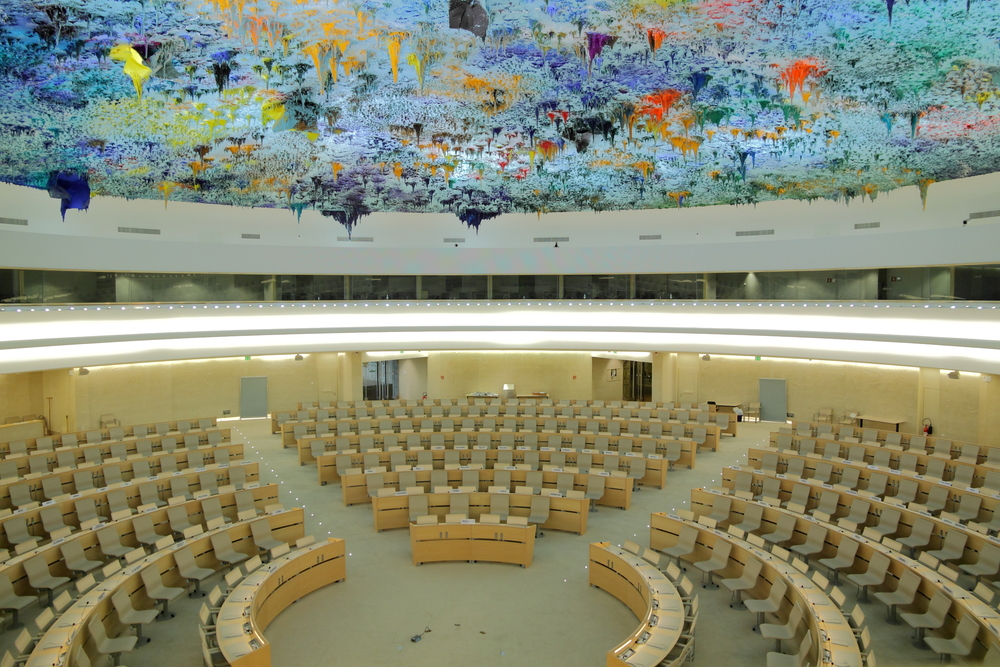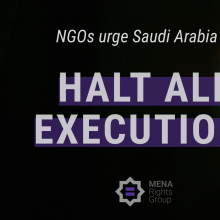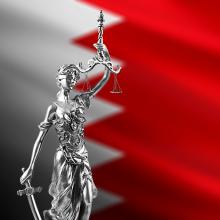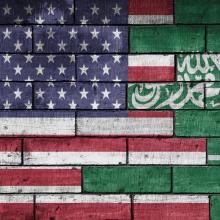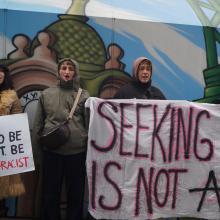October 02, 2023
On September 29, 2023, the United Nations (UN) Assistant Secretary-General for Human Rights, presented the annual report of the UN Secretary-General on intimidation and reprisals against those cooperating with the UN, its representatives and mechanisms. The report highlights allegations of acts of intimidation and reprisals committed during the reporting period, – i.e., from May 1, 2022, and April 30, 2023 – as well as updates on acts of reprisals documented in previous reports. In April, MENA Rights Group had presented a submission to the UNSG, highlighting new cases of reprisals and updates on previous cases we have been following.
Reprisals in the Middle East and North Africa (MENA)
Algeria
Two new cases have been raised in the report: Kaddour Chouicha and his wife Jamila Loukil. Chouicha was the Vice-President of the Algerian League for the Defence of Human Rights (LADDH), now dissolved, and is the national coordinator of the Union of Teachers. Loukil is a journalist and human rights defender.
On August 24, 2022, the Border Police Services of the Oran airport prevented the couple from traveling to Paris. Chouicha was supposed to attend discussions with the International Labour Organization (ILO), and Loukil was meant to travel to Geneva for a Universal Periodic Review (UPR) pre-session on Algeria at the UN Headquarters.
Algerian authorities are thus preventing these human rights defenders from freely conducting their work, including their cooperation with the UN and international civil society.
Bahrain
The UN Secretary General's report expressed concern over continued acts of reprisals against human rights defenders in Bahrain, including Mr Abdulhadi al-Khawaja, Mr Abduljalil al-Singace and Sayed Ahmed al-Wadaei.
Djibouti
Already included previous reports, the 2023 report included the Djiboutian authorities’ reprisal against Kadar Abdi Ibrahim, a human rights defender, journalist and the head of the Mouvement pour la démocratie et la liberté (MoDEL). Ibrahim travelled to Geneva in April 2023, carrying out advocacy ahead of Djibouti’s UPR, and meeting with UN member states and OHCHR representatives. Upon his return to Djibouti, he was briefly detained and had his passport confiscated by the secret services, who also raided his home. Although he was released shortly after his arrest, he was unable to retrieve his passport, preventing him from participating in the review of Djibouti in May 2023. His passport is still retained.
Furthermore, two members of the International Federation for Human Rights (FIDH), Alexis Deswaef and Victoire d’Humières were mentioned in the reprisals report for the first time.
Egypt
Two Egyptian human rights defenders, among others, were mentioned in the reprisals report: Ahmed Shawky Abdelsattar Mohamed Amasha and Ebrahim Abdelmonem Metwally Hegazy.
Amasha is a human rights defender who has helped the families of those forcibly disappeared and arbitrarily detained in Egypt, including by submitting cases to the UN Working Group on Enforced or Involuntary Disappearances (WGEID). Due to his work as a human rights defender and his cooperation with the UN, he has long been targeted by the Egyptian authorities and mentioned in the reprisals report every year since 2017. Detained since 2020, Amasha is still prevented from family visits and from meeting his lawyer privately, and has not received adequate medical care.
Similar to Amasha, Hegazy is also a human rights lawyer and the co-founder and coordinator of the Association of the Families of the Disappeared. He was arrested in 2017 while traveling to Switzerland to discuss enforced disappearances with the WGEID. Since his detention, he has been prevented from family visits and suffers from ill-treatment inside the prison. He has been mentioned in the reprisals report since 2018.
Iraq
The Secretary-General expressed concern over the UN Assistance Mission for Iraq’s reporting of reprisals against human rights defenders. One example is the disappearance of human rights lawyer Ali Jaseb Hattab Al Heliji since 2019, who represented several demonstrators arrested in connection with the anti-government October protests. His father was assassinated a few months later for claiming his son was abducted by the Popular Mobilisation Unit (PMU). To date, his case remains pending before the UN Committee on Enforced Disappearances (CED).
Moreover, the CED also expressed concern over reprisals against individuals searching for their forcibly disappeared loved ones.
Libya
The report also mentioned multiple incidents against human rights defenders reported by the United Nations Support Mission in Libya in 2023, and followed up on allegations of reprisals made in 2020.
Qatar
The Secretary-General expressed concern over the use of cyberattacks against a non-governmental organisation called Just Access. The organisation’s director, Mark Somos, had filed complaints and urgent appeals to several UN mechanisms on behalf of a Qatari individual shortly before the start of these attacks.
Saudi Arabia
Saudi Arabia had the highest number of mentions in the reprisals report, due to its consistent pattern of reprisals against human rights defenders.
Mentioned consistently in the reprisals report over the years is none other than Mohammed Fahad al-Qahtani. A lawyer and co-founder of the Saudi Association for Civil and Political Rights (ACPRA, now dissolved), he was sentenced to 10 years in prison in 2013 in reprisal against his human rights work. Although he completed his sentence in November 2022, he continues to be arbitrarily detained, despite repeated UN and civil society calls for his release. Furthermore, he has been denied contact with his family since October 2022, making him forcibly disappeared.
ACPRA member and human rights defender Fawzan al-Harbi has also been detained since 2013. His sentence just expired in September 2023, but he continues to be arbitrarily detained.
Finally, Essa al-Nukheifi is a human rights defender and anti-corruption activist who has been repeatedly subjected to reprisals for his human rights activism and cooperation with international civil society and the UN. He has been detained since 2016, despite the expiry of his sentence in October 2022. Similar to Mr al-Qahtani, he remains forcibly disappeared.
United Arab Emirates
Although the reprisals report did not mention any individual case, it did refer to the Committee against Torture’s (CAT) Concluding Observations of 2022. The CAT expressed concern over widely documented acts of torture committed by UAE authorities, which continue to be treated with complete impunity.
Yemen
The Secretary-General’s reprisals report referred to the UN Committee on Economic, Social and Cultural Rights’ reporting of reprisals against human rights defenders.
Conclusion
MENA Rights Group will keep monitoring acts of reprisals across the MENA. If you would like to report acts of reprisals and intimidation against individuals and groups engaging with the UN, do not hesitate to contact us so that we can alert the Assistant Secretary-General for Human Rights and the Office of the UN High Commissioner for Human Rights.

